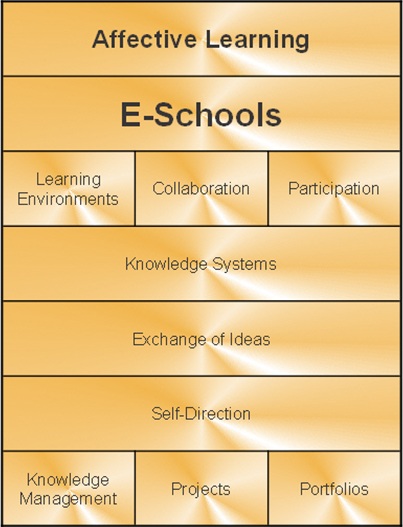Published on
Affective Learning E-Schools

Affective learning e-schools exist on computers. They do not require dedicated structures. They are based on the organization of ideas into courses and programs using the knowledge management frameworks described in previous articles. E-schools are distinguished by their focus on purposeful learning always working from the perspective of meaningful engagement of the learner.
Learning Environments
E-schools can be used in any kind of learning environment. This includes formal schools such as grade schools, colleges, universities, alternative schools, apprenticeships, internships, etc. E-schools can be used for workplace specific learning or in the community for casual informal learning. They can be used for lifestyle change and enhancement and for social learning. They can be used on a small scale or a large scale.
Collaboration
E-schools exist on computer databases and can be shared over networks and linked to existing Internet resources or specific developed resources. They can be organized using wiki. They become instruments of collaboration and exchange among mentors and learners within a single structure or across a nation.
Participation
E-schools are instruments of participation and creativity. Learners become involved in the design of the frameworks and the choices of linked resources. They take part in every aspect of their own learning. Mentors and teachers supervise and facilitate learning. Everything is participatory.
Knowledge Systems
E-schools go beyond language to structure knowledge. Each school is a knowledge system consisting of a hierarchy of reference frameworks. Idea frameworks are linked to course frameworks. Course frameworks are linked to program frameworks. Program frameworks are linked to department frameworks. Department frameworks are linked to the overall framework of the school. All frameworks are based on the concept that ideas have nine dimensions and are combinations of other ideas which exist on five knowledge management levels.
Exchange of Ideas
The focus of the e-school is the exchange of ideas among learners and mentors. The most important thing to remember is that when we decide to learn, we don’t know what we are trying to know. Therefore it is important to have the framework system to guide us along the way. Learning systems are multidimensional, dynamic, interactive and integrated and can be continuously adapted and improved.
Self-Direction
E-schools encourage confidence building through self-direction. We are always rationalizing, moving ahead and fixing mistakes as we go. Failure is associated with attempts and analysis. Keep trying until you get it right; then keep trying until you are good at it; and then keep trying until you are the best.
Knowledge Management
The knowledge management frameworks described in previous articles is a tool box for developing affective learning e-schools. They can be used for framing learning, developing and facilitating learning experiences, building learning programs, and for developing policy and governance for the e-school and the venue in which it is used.
Projects
The central activity of affective learning e-schools is the project. All course materials are developed from a project perspective. Sometimes the whole course is one project, sometimes it is several. Projects are the manifestation of ideas and the vehicle for exchanging them. Projects are real and meaningful and can be adapted to the circumstances of the learning environment and the needs of the learner. Projects can be simulated in the traditional classroom, laboratory or shop, or can be real activities using the workplace or the community as the classroom and co-workers as mentors.
Portfolios
Learners in e-schools construct continuous portfolios of their work. The portfolio reflects the learner’s achievements and provides a sense of pride. It can be used to assess all aspects of learning and to direct intervention by mentors as needed.
In short, the affective learning e-school can be the core of education and training in the information age. Unlike the industrial age where knowledge was a commodity to be marketed, we now have practically free access to everything we need to know. So education and training has to move from being a broker of information to providing the structures and processes to manage knowledge and we have to do this in an environment that supports natural affective learning.
In my next article, I will write about the design, development implementation of e-school projects and the use of portfolios in learning.
Author Perspective: Business



